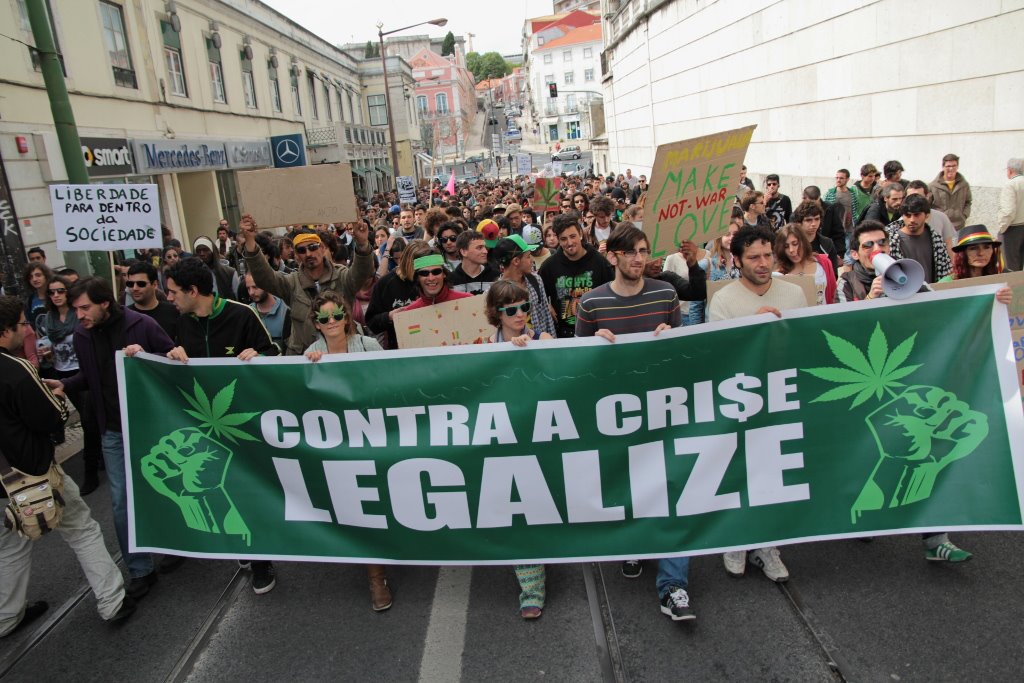After over a decade of decriminalisation in Portugal, the political party Bloco de Esquerda has proposed the implementation of the Cannabis Social Club model which has been gaining momentum throughout Europe as a viable alternative to the black market supply chain that funds criminal organisations and leaves quality in the hands of often unscrupulous criminals.
On the 23rd of April 2013 the socialist-left Bloco de Esquerda (Left Bloc) submitted a proposal to the Portuguese parliament to legalise the cultivation of cannabis for personal use as well as create a legal framework for the operation of Cannabis Social Clubs based on the success of such experiments in Spain, Belgium and Switzerland, as well as the successful ballots for legalisation of recreational cannabis which took place in Colorado and Washington states in November 2012. The proposal will be debated in Portuguese Parliament on the 8th May 2013.
The opening of the proposal explains the motives and reasons behind it, referring to the UN’s 2011 Global Report on Drugs which showed that the prohibitionist ‘War on Drugs’ has been a gigantic failure that has failed to curb drug consumption in the slightest while gifting enormous amounts of money to organised criminals and terrorists, funding violence and corruption across the globe. It is also pointed out that cannabis is the most used illegal drug in the world, with the UN calculating that 203 million people have used it within the last year.
In 2001, amidst an epidemic of HIV among injecting drug users, Portugal decriminalised the consumption of all drugs, deciding to refer users to healthcare professionals rather than treating them as criminals. This has been hailed as a success and held up as a global example of alternatives to prohibition. However the supply side is still criminalised and illicit, meaning that users of cannabis, have to either resort to the black market and fund organised crime, or become criminals by growing for themselves.
Recognising that cannabis use carries risks no greater than those of legal substances such as tobacco and alcohol, the proposal states that a truly harm reduction centric policy would remove users from the black market by providing a regulated supply of cannabis with quality control checks in place as well as providing informed and balanced education on use and risks associated with use.
As such the Bloco de Esquerda propose the legalisation of cultivation for personal use, in conjunction with the creation of Cannabis Social Clubs as seen in Spain, Belgium and Switzerland in order to combat trafficking and to reduce the harms associated with cannabis use. The non-profit model of Cannabis Social Clubs is not in direct contravention with international conventions which prohibit the sale, import and export of cannabis. The clubs are non-profit associations of cannabis users who take part in collective cultivation for the personal use of the members, assuring quality control and taking responsibility for the transport and distribution of cannabis to members. The clubs have rules to exclude minors (those under 18) as well as to define the quantity of cannabis that each club has the right to cultivate (based on a predetermined limit for a reasonable 30 day supply – current law states that a 10 day supply is equal to 25g of herbal cannabis), there will also be a limit of 300 members per club, with users limited to membership of a single club. The sale and consumption of alcoholic beverages is forbidden on club premises, which will have to be over 300m from schools or nurseries.
This is good news for cannabis consumers not just in Portugal but in the UK and the rest of the world as it sets a precedent of political support for the Cannabis Social Club model and will provide even more evidence of the model’s efficacy if implemented. It also demonstrates that the social club model with regards to cannabis has many benefits over plain decriminalisation which still leaves the market completely unregulated and uncontrolled.
Let us hope that this proposal receives a positive response during the parliamentary debate on the 8th May and that we will again be able to use Portugal’s policies as shining examples of successful alternatives to the ‘War on Drugs’ which has claimed countless human lives over the last 40 years.
Let us hope that this proposal receives a positive response during the parliamentary debate on the 8th May and that we will again be able to use Portugal’s policies as shining examples of successful alternatives to the ‘War on Drugs’ – the policy of prohibition that has been used for the last 40 years as a tool to curtail personal freedoms, claiming countless lives in the process.





